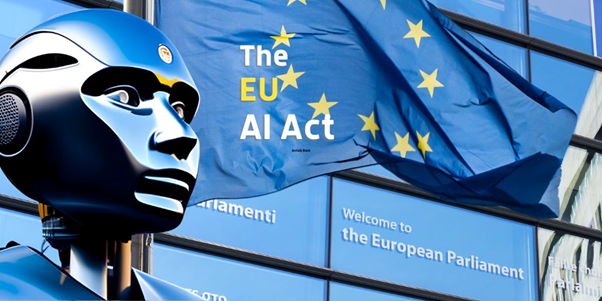The European Union (EU) is on the cusp of becoming a global frontrunner in regulating artificial intelligence (AI) with the official endorsement of a groundbreaking set of rules by its member states. This pioneering legislation, known as the AI Act, establishes a comprehensive framework for overseeing the development, deployment, and use of AI technology, with the potential to influence regulations around the world.
A Global First:
The AI Act stands out for its ambitious and nuanced approach. In contrast to the United States’ preference for a lighter touch, relying more on voluntary compliance, or China’s focus on leveraging AI to maintain social control, the EU’s legislation prioritizes transparency, accountability, and building trust in AI development. This first-of-its-kind law in the world strives to address the potential risks and pitfalls of AI while simultaneously fostering innovation and economic growth within the EU.
Key Pillars of the AI Act:
- Strict Scrutiny for High-Risk AI: The Act mandates stringent transparency requirements for high-risk AI systems, such as those used in critical infrastructure, facial recognition technology, and recruitment processes. These requirements ensure that AI decisions are made in an explainable and auditable way, allowing users to understand the rationale behind the AI’s outputs. This fosters trust in AI systems and mitigates the risk of biased or discriminatory outcomes.
- Balancing Security and Privacy Concerns: The Act walks a tightrope between security concerns and citizen privacy rights. It restricts the use of real-time biometric surveillance in public spaces, allowing such measures only in exceptional circumstances, such as preventing imminent terrorist attacks or apprehending dangerous criminals. This provision aims to safeguard privacy rights while acknowledging legitimate security needs. Law enforcement agencies will still have access to AI-powered surveillance tools, but under strict regulations that ensure they are used proportionately and only for legitimate purposes.
- Global Repercussions: The reach of the AI Act extends far beyond the EU’s borders. Companies worldwide that leverage EU customer data in their AI platforms will need to comply with the Act’s regulations. This expansive reach, similar to the impact of the EU’s General Data Protection Regulation (GDPR), has the potential to establish a global benchmark for AI governance. By setting a high bar for ethical AI development, the EU can encourage other countries to adopt similar regulations, fostering a more responsible and trustworthy global AI ecosystem.
Phased Implementation Plan:
The AI Act will come into effect next month, but the full weight of its regulations will be felt gradually over time. Here’s a breakdown of the rollout schedule:
- Immediate Bans: Certain high-risk practices, like social scoring systems, predictive policing based solely on AI algorithms, and mass scraping of facial recognition data, will be prohibited within six months of the Act’s entry into force. These bans aim to mitigate the potential for AI to be used to unfairly discriminate against or manipulate citizens.
- Gradual Onboarding: Requirements for general-purpose AI models (those used for a wide range of tasks) will take effect after one year. Rules for AI integrated into existing regulated products, such as medical devices, will take effect in three years. This phased approach allows companies time to adjust their AI development and deployment practices to comply with the Act’s regulations.
- Enforcement with Fines: Violations of the Act will be met with substantial fines, ranging from €7.5 million or 1.5% of a company’s global turnover to €35 million or 7% of their global turnover, depending on the severity of the offence. These significant fines serve as a deterrent against non-compliance and underscore the EU’s commitment to enforcing the Act’s provisions.
A New Era of Responsible AI Development:
The EU’s AI Act marks a significant leap forward towards responsible development and deployment of AI technology. This legislation has the potential to shape global conversations around AI ethics and ensure that this powerful technology is harnessed for the betterment of humanity. By setting a clear and comprehensive framework for AI governance, the EU can foster innovation while mitigating the risks of AI misuse. The Act’s influence is likely to extend beyond the EU’s borders, prompting other countries to adopt similar regulations and paving the way for a more ethical and trustworthy future for AI.










